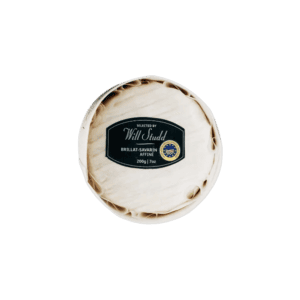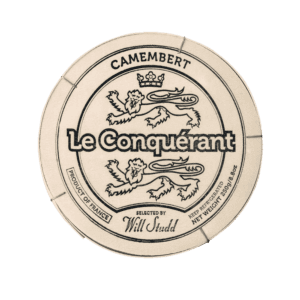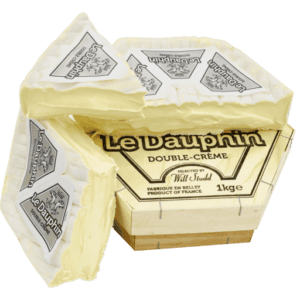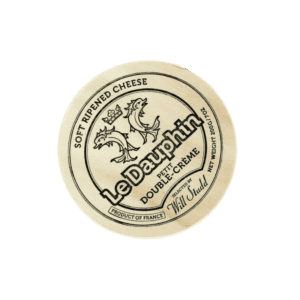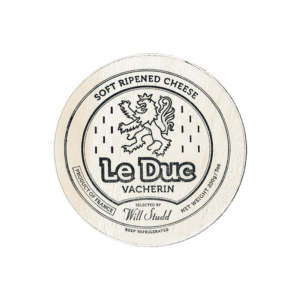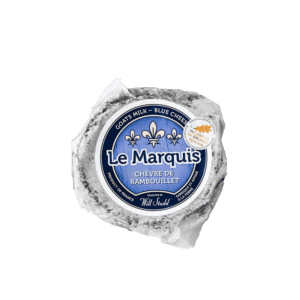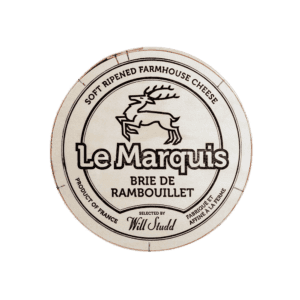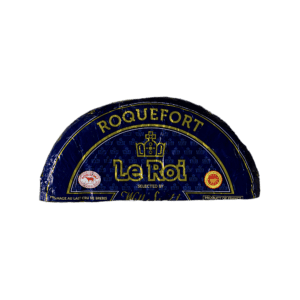Will Studd Brillat Savarin PGI 200g King William Road Store Adelaide PICK UP Only
$28.95
Will Studd Brillat Savarin PGI is a decadent triple-cream cheese and is the perfect party pleaser. It takes its name from the famous 18th-century French food writer Brillat Savarin, and was originally created in the 1950s by Parisian affineur, Pierre Androuet.
This example from Bourgogne, France is unique because, unlike its industrial cousins, it’s ripened under a thin coat of wrinkled yellow Geotrychum mould naturally found in unpasteurised cow’s milk. This mould is rarely used because it is hard to wrap, but the poplar wooden box creates the ideal, moist microclimate for it to thrive.
Deliciously creamy with a slightly chalky centre when young, the texture gradually breaks down until it can be scooped from the centre with a spoon close to its use-by date.
Note: Occasionally our Brillat Savarin will have fluffy white spots / ‘bunny tails’ on its surface. This is entirely natural and does not pose a food safety issue. The small white mould clusters are Penicillium Candidum, similar the moulds used on brie and camembert and develop when the cheese ages.
Add to cart
Will Studd Le Conquérant Camembert 250g Adelaide Metro Only
$28.95
Le Conquérant Camembert is a close cousin of Camembert de Normandie. Its strong aromatic hints of wet straw, brassica and apples are a reminder of why this authentic cheese has become a proud symbol of French cheese-making skills. Handmade for Will in the Pays d’Auge region of Normandy, its secret lies in the use of specially selected cultures, moulds and yeasts and, of course, rich Normandy milk.
The traditional wooden poplar box and wax-paper wrap create a microclimate that encourages the chalky heart of a young cheese to slowly break down over three to four weeks, eventually becoming deliciously soft and fudgy by the use-by date.
Read more
Will Studd Le Dauphin Double-Crème King William Road Store Adelaide PICK UP Only
$109.95 per Kg
Le Dauphin Double-Créme is an unusual hexagonal cheese is a guaranteed crowd-pleaser and takes its name from the term once used to describe the heir apparent to the throne of France.
Select options
Made from rich cow’s milk collected from the beautiful green mountain pastures surrounding the Rhône Valley, it was specially created for Will using a combination of modern techniques and a careful selection of traditional surface moulds.
The wooden box is important because it protects the cheese, and also creates a unique micro-environment for maturation. Best enjoyed fully ripened when exceptionally soft, silky and deliciously creamy.
Will Studd Le Dauphin Petit Double-Crème 200g King William Road Store Adelaide PICK UP Only
$28.95
Le Dauphin Petit Double-Crème is a decadent soft-ripened, double cream cheese is produced for Will in Bourgogne and takes its name from the term once used to describe the heir apparent to the throne of France.
It is hand-made from local cow’s milk and added cream, which is curdled using traditional overnight lactic fermentation techniques that date back to monastic times. The protective lidded wooden box and old-fashioned wax-paper wrap create unique micro conditions that allow the carefully selected surface moulds to slowly ripen the fine, chalky interior of the cheese over 3-4 weeks.
This delectable treat is ideally served at room temperature close to the use-by date, when the centre has broken down to a soft unctuous texture, with a distinctive creamy lactic finish that is guaranteed to please.
Will Studd Le Duc Vacherin 200g King William Road Store Adelaide PICK UP Only
$28.95
Deliciously soft and fragrant spruce-bark bound cheeses have been enjoyed as a winter treat in the mountains that border France and Switzerland since the Middle Ages. Traditionally, these cheeses were produced when the cows returned from grazing on high-altitude pastures, where their rich milk was used to make huge wheels of cheese. The smaller spruce bound cheeses offered a practical way of using the limited amount of milk available during the winter months.
Vacherin Le Duc is hand-made in limited quantities using similar techniques but, unlike its older cousins, it is available throughout the year. The cheese has a mild, rich creamy flavor and soft fudgy texture when young. If left to ripen in the box, the smooth pinkish rind starts to bloom and ripple, and the inside softens to a delectable oozing melt-in-the-mouth texture, with a fragrant hint of the forest.
Serve ripe with a spoon at room temperature, or heat in the box in the oven. Either way, make sure to scrape and eat the cheese closest to the spruce bark strip – it’s the best part!
Add to cart
Will Studd Le Marquis Chèvre de Rambouillet Goat Bleu King William Road Store Adelaide PICK UP only
$149.95 per Kg
Le Marquis Chèvre de Rambouillet Bleu is a pure goat milk chèvre, is hand made on a farm not far from the famous castle of Rambouillet, which housed a model dairy built for Marie Antoinette during the reign of Louis XVI.
It’s difficult to find a goats milk blue cheese that is in optimum condition, as the composition of the milk has a tendency to produce very strong flavours. The secret of this soft, supple cheese is that it starts with exceptional quality fresh milk collected from the farm’s pristine herd of 350 Alpine Chamoisée and Murciano-Granadina breeds.
The traditional coat of fine charcoal encourages a unique rind to form a protective coat, while selected strains of Penicillium Roqueforti mould form an intricate web of dark blue veins inside. The result is a triumph of modern farm cheese-making techniques. Will selected Le Marquis Bleu de Chèvre, for its enticing, mild, savoury blue flavours, which gradually develop as the cheese ages.
Select options
Will Studd Le Marquis Farmhouse Brie de Rambouillet Adelaide Metro Only
$109.95 per Kg
In France, it is increasingly hard to find farmstead cheese made with milk from a single farm. Most examples are produced in very small quantities from raw milk, and these are rarely found outside the area of production.
This soft, surface mould-ripened cheese, specially selected by Will, is a wonderful exception. It is hand made in a modern, purpose-built ‘fermier’ that lies in the shade of the Rambouillet deer forest, south west of Paris. The original ‘Fromages de Brye’ made on small farms in the countryside outside the city varied in size depending on the season, and amount of milk available. Following in this tradition Le Marquis Brie de Rambouillet is made in two sizes using fresh pasteurised milk sourced exclusively from a small herd of pampered cows.
The unique combination of moulds, cultures and a traditional poplar wood box helps to ensure that the chalky centre of the young cheese slowly breaks down to a soft gooey texture over 3-4 weeks of careful ripening. One can tell when Le Marquis Brie is at its optimum because it has a distinct fungal aroma and is soft when pressed. The ‘cowy’ barnyard flavours of the mature cheese are a perfect reminder of why ‘fermier’ cheese is so special.
Read more
Will Studd Le Roi Roquefort AOC by Carles King William Road Store Adelaide PICK UP Only
$159.95 per Kg
Roquefort is recognised as the Cheese of Kings and King of French cheese.
Under strict AOC regulations all cheese bearing the famous name must be made from unpastuerised ewe’s milk collected from the Lacaune breed in the Aveyron region and the Carles family is one of the smallest and most respected of all producers.
It was Jacques Carles who helped Will overturn the Australian Roquefort ban way back in 2005 and we are delighted to continue this family link with the appropriately named ‘Le Roi’ Roquefort.
Produced by Jacques’ daughter Delphine this cheese is the only Roquefort which is now entirely handmade using traditional old school methods passed down over generations.
According to Delphine patience, empathy and respect are essential to ensure Roquefort reflects a genuine taste of place. In keeping with her family tradition cheesemaking begins in the afternoon using fresh raw ewe’s milk collected that morning from fifteen small farms.
The late start is to ensure the natural flora and microbes in the ‘live’ milk actively are not compromised by cold storage and will contribute to the development of flavour and texture without the excessive use of commercial starter cultures.
At the hooping stage a secret combination of Pencillium Roqueforti moulds cultivated on large carbon-crusted wood-fired loaves is sprinkled into the fresh hand ladled curds. The young cheese is then left to drain very slowly over two days in humidity-controlled rooms before being hand-salted and transported to the village of Roquefort for piercing and maturation.
The family caves are naturally cooled by limestone fissures known as ‘fleurines’ that run beneath the crypt of the village church, and the damp microclimate found here is responsible for the unique steely blue moulds that grow inside the cheese. What makes this Roquefort extra special is that Delphine is the only producer to mature Roquefort the old-fashioned way directly on ancient oak shelving, rather than in plastic crates.
As you would expect every batch of this remarkable artisan cheese is slightly different depending on the season and maturation period. It has been carefully selected for its soft creamy texture and balance of rich, sweet, salty savoury flavours.
It truly doesn’t get any better than this– enjoy!
Select options
Product Categories
Brands
- All brands
- Acetaia Leonardi
- Acide
- Albeniz
- Ambrosio
- Ardoino
- Bellata Gold Milling Semolina
- Bisol 1542
- Callebaut
- Cheeseland Holland
- Confiletas Pastry Shells
- Conservas Ortiz
- Delicius
- El Avion
- Fancy Hanks
- Farine Moretti
- Ferron Rice
- Flamigni 1930
- Fromagerie Germain
- Illy
- Kbirr
- La Giardiniera Di Morgan
- Maestri Pastai
- Mandolé Orchard
- Marabissi
- Mulino Bianco
- Olsson's Salt
- Panettone Vergani
- Pasticceria Perbellini
- Patatas Torres
- Paul Dischamp
- Pepe Saya
- Pino's Dolce Vita
- Pollastrini Sardine
- Rio Vista Olives
- Rustichella D'Abruzzo
- Secondo Vergani
- Tartufi Morra
- Trevallie Orchard
- Vannella Cheese
- Venchi
- Vincente Delicacies
- Vivaldi
- Will Studd
- Xavier David

